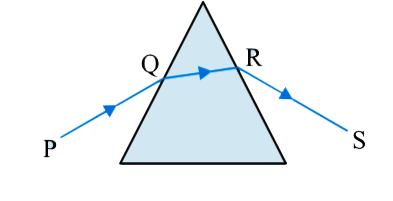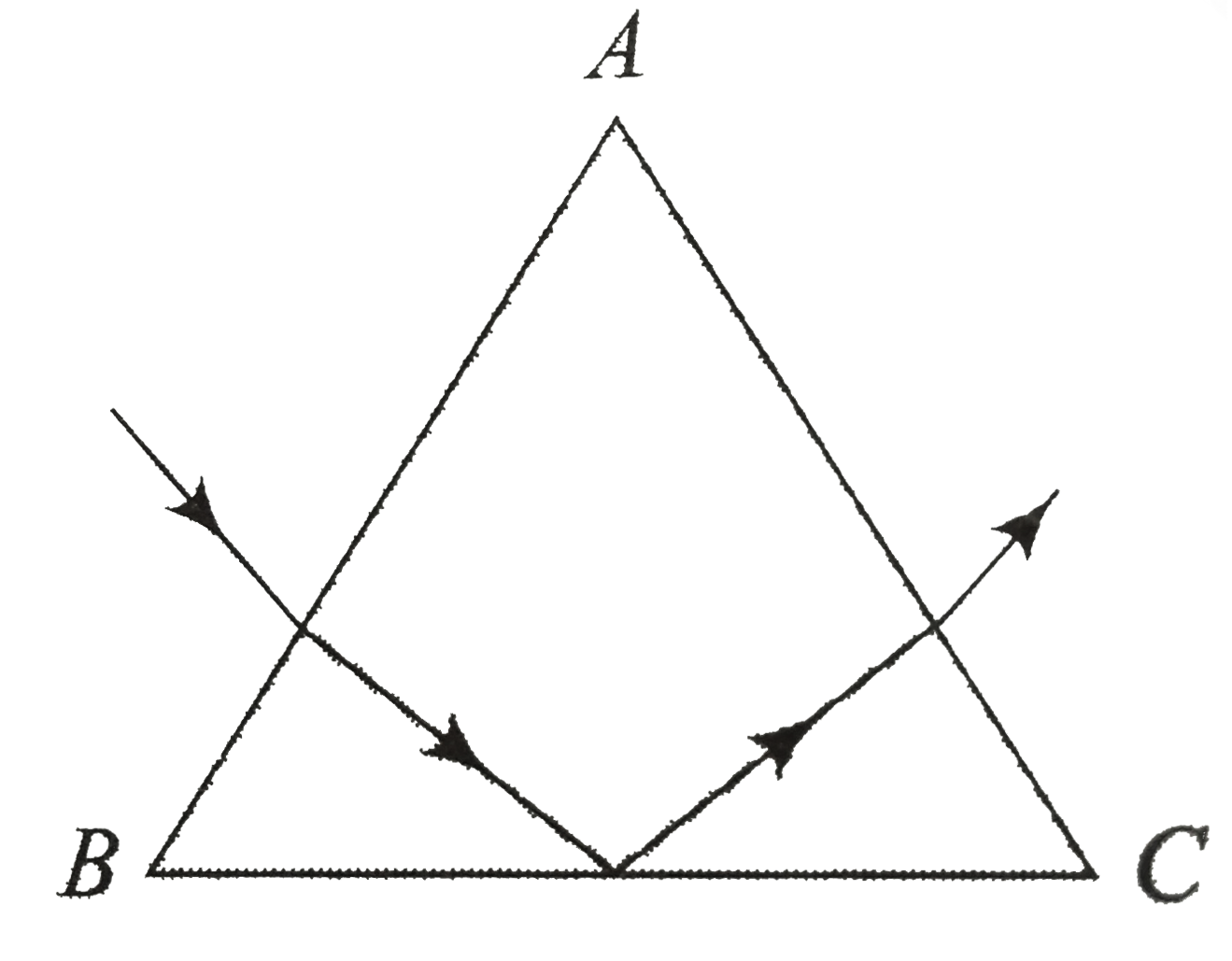A ray of light passing through an equilateral triangular glass prism from air undergoes minimum deviation when angle of incidence is 34th of the angle of prism. Calculate speed of light in prism.
To solve the problem step by step, we will follow the logical flow of the concepts involved in the refraction of light through a prism.
Step 1: Understand the Geometry of the Prism
The prism is an equilateral triangle, which means each angle is 60 degrees. Let's denote the angle of the prism as A=60∘.
Step 2: Determine the Angle of Incidence
According to the problem, the angle of incidence I is 34 of the angle of the prism. Therefore, we can calculate I:
I=34×A=34×60∘=45∘
Step 3: Apply the Minimum Deviation Condition
For minimum deviation in a prism, the angles of refraction R1 and R2 at the two faces of the prism are equal, i.e., R1=R2. The relationship between the angles is given by:
R1+R2=A
Since R1=R2, we can write:
2R1=A⟹R1=R2=A2=60∘2=30∘
Step 4: Use Snell's Law to Find the Refractive Index
Using Snell's Law at the first interface (air to prism):
n=sinIsinR
Substituting the values we have:
n=sin45∘sin30∘
We know:
sin45∘=1√2andsin30∘=12
Thus,
n=1√212=1√2×2=√2
Step 5: Relate Refractive Index to Speed of Light
The refractive index n is also related to the speed of light in vacuum c and the speed of light in the medium v by the equation:
n=cv
Rearranging gives us:
v=cn
Substituting c=3×108m/s and n=√2:
v=3×108√2
Step 6: Calculate the Speed of Light in the Prism
Now we calculate v:
v≈3×1081.414≈2.121×108m/s
Final Answer
The speed of light in the prism is approximately:
v≈2.1×108m/s
---
The prism is an equilateral triangle, which means each angle is 60 degrees. Let's denote the angle of the prism as A=60∘.
According to the problem, the angle of incidence I is 34 of the angle of the prism. Therefore, we can calculate I:
I=34×A=34×60∘=45∘
For minimum deviation in a prism, the angles of refraction R1 and R2 at the two faces of the prism are equal, i.e., R1=R2. The relationship between the angles is given by:
R1+R2=A
Since R1=R2, we can write:
2R1=A⟹R1=R2=A2=60∘2=30∘
Using Snell's Law at the first interface (air to prism):
n=sinIsinR
Substituting the values we have:
n=sin45∘sin30∘
We know:
sin45∘=1√2andsin30∘=12
Thus,
n=1√212=1√2×2=√2
The refractive index n is also related to the speed of light in vacuum c and the speed of light in the medium v by the equation:
n=cv
Rearranging gives us:
v=cn
Substituting c=3×108m/s and n=√2:
v=3×108√2
Now we calculate v:
v≈3×1081.414≈2.121×108m/s
The speed of light in the prism is approximately:
v≈2.1×108m/s
Topper's Solved these Questions
- XII BOARDSBOOK - XII BOARD PREVIOUS YEAR PAPER ENGLISHCHAPTER - XII BOARDSEXERCISE - SET I
54 Videos
- XII BOARDSBOOK - XII BOARD PREVIOUS YEAR PAPER ENGLISHCHAPTER - XII BOARDSEXERCISE - SET II
8 Videos
- SAMPLE PAPER 2019BOOK - XII BOARD PREVIOUS YEAR PAPER ENGLISHCHAPTER - SAMPLE PAPER 2019EXERCISE - SECTION D
6 Videos
Similar Questions
A ray of light passing through an equilateral triangular glass prism from air undergoes minimum deviation when angle of incidence is 3/4 th of the angle of prism. Calculate the speed of light in the prism.
View Solution(a) Draw a ray diagram to show the image formation by a combination of two thin convex
lenses in contact . Obtain the expression for the power of this combination in terms of the
focal lengths of the lenses.
(b) A ray of light passing from air through an equilateral glass prism undergoes minimum
deviation when the angle of incidence is 3(4)th of the angle of prism . Calculate the speed of ltbRgt light in the prism.
View Solution
Knowledge Check
A ray of light passes through an equilateral prism (refractive index 1.5) such that angle of incidence is equal to angle of emergence and the latter is equal to 3/4th of the angle of prism. Calculate the angle of deviation.
A60∘B30∘C45∘D120∘
An equilateral prism produces a minimum deviation of 30∘. The angle of incidence is
View SolutionA ray of light passes through an equilateral glass prism in such a manner that the angle of incidence is equal to the angle of emergence and each of these angles is equal to 3/4 of the angle of the prism. The angle of deviation is
View SolutionA ray of light passing through a prism having refractive index √2 suffers minimum deviation. It is found that the angle of incidence is double the angle of refraction within the prism. What is the angle of prism?
View SolutionA ray of light incident on an equilateral triangular glass prism of μ=√3 moves parallel to the base of the prism inside it. What is the angle of incidence for this ray ?
View SolutionA ray of light passes through the equilateral prism such that angle of incidence is equal to the angle of emergence if the angle of incidence is 45∘. The angle of deviation will be
View SolutionA ray of light is incident on an equilateral glass prism placed on a horizontal table. For minimum deviation which of the following is true:

View SolutionThe path of a ray of light passing through an equilateral glass prism ABC is shown in figure. The ray of light is incident on face BC at the critical angle for just total internal reflection. The total internal reflection. The total angle of deviation after the refraction at face AC is 108∘. Calculate the refractive index of the glass.

View Solution
